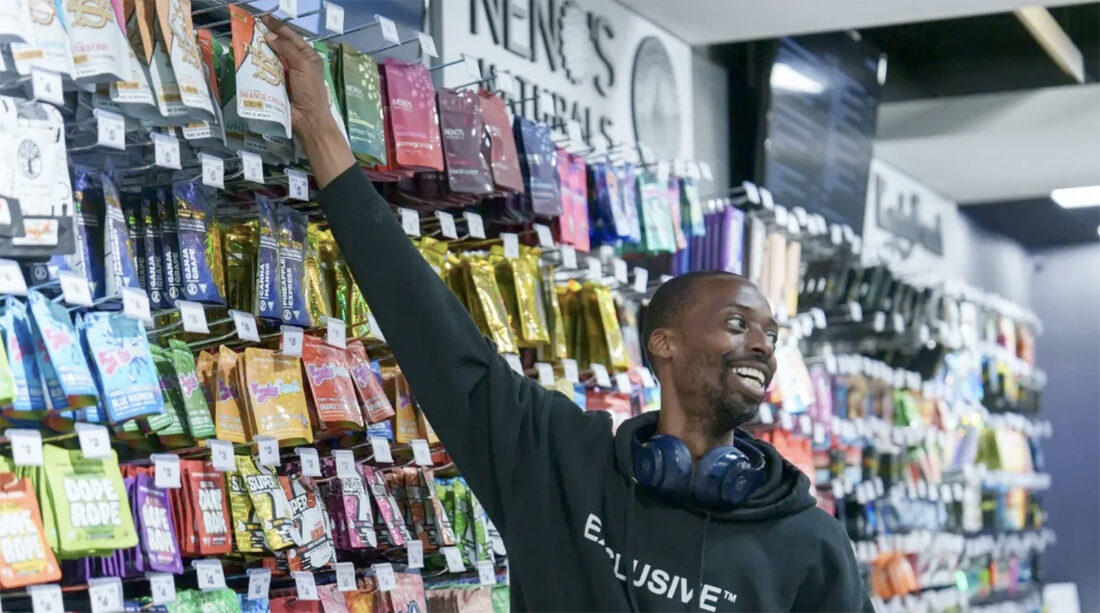Sweeping plan would cap Michigan marijuana shops, freeze new applications

Proposed state legislation would prohibit new marijuana retail licenses in Michigan communities like Coldwater, which already has more than one shop per 10,000 residents. (Josh Boland for Bridge Michigan)
(This story was originally published by Bridge Michigan, a nonprofit and nonpartisan news organization. Visit the newsroom online: bridgemi.com.)
LANSING — Under strain from stiff competition and a pending new tax, Michigan’s marijuana industry is asking state lawmakers to broadly limit new business licenses and restrict currently unregulated, synthetic alternatives.
A state Senate panel on Wednesday began debating a sweeping set of bills that would do just that.
A proposal from state Sen. Sam Singh, D-East Lansing, would indefinitely prohibit the state from issuing new licenses for testing labs, transportation companies and any growing operation cultivating more than 150 plants, beginning in 2026.
It would also cap the number of retail marijuana stores in a given municipality to not more than one for every 10,000 residents. Existing businesses in towns over the limit could continue to operate, but the state could not issue new retail licenses in any municipality that is over that ratio.
Other bills would move synthetic and hemp-based marijuana-mimicking products under the authority of the state’s Cannabis Regulatory Agency.
Michigan voters legalized recreational marijuana in 2018, and retail sales began in late 2019. After years of explosive growth, sales have plateaued, a fact industry observers say means the market is nearing saturation.
Pervasive oversupply and stiff competition between new businesses has led to rock-bottom prices and left some large chains in a precarious financial position. Crain’s Detroit Business reported 13 Michigan marijuana businesses are in court-sponsored receivership as of August.
Robin Schneider, the leader of the Michigan Cannabis Industry Association, said her organization’s members have told her, “We can’t continue to do unlimited licenses, or all of us will lose everything.”
Because the legislation aims to overhaul the state’s voter-approved marijuana law, it would require three-fourths approval from both chambers of the Michigan Legislature to reach the governor’s desk for potential signature.
‘Monopolies or oligopolies’ and a new tax
Existing Michigan marijuana business owners would benefit from the legislation, but it could also stifle competition in the sector by effectively blocking new businesses from entering profitable markets.
The nonpartisan Senate Fiscal Agency said the legislation “would create regional monopolies or oligopolies” for established dispensaries in communities where new licenses would be prohibited.
But the Michigan Cannabis Industry Association and other supporters say the proposal is timely given pressures businesses will face because of a new 24% wholesale marijuana tax set to take effect in January.
The association, along with a Harrison Township cultivator named Holistic Research Group, is suing the state over the new tax, which Gov. Gretchen Whitmer signed into law last week as part of a state budget deal that aims to raise hundreds of millions of dollars annually for road repairs.
“I don’t know how we’re going to survive the sudden shock” from the new tax, “but we sure are going to try,” said Robert Sims, a former Detroit Lions player who now owns the marijuana grower and retailer Primitiv Group with fellow Lions veteran Calvin Johnson.
Some small business owners oppose the new legislation, however.
Steven Wagner from Alien Tek Farms recently opened a 12,000-square-foot grow operation in Vassar, and he said capping licenses “would essentially freeze us out from vertically integrating or expanding in any way.”
Wagner said the proposal could force him out of Michigan’s market.
“I don’t know how you guys really justify giving loopholes in legislation and benefits to the big guys while little guys are seemingly getting stomped,” Wagner said.
The vast majority of marijuana growers in Michigan — 828 businesses — operate under a large grower license that allows them to cultivate up to 2,000 plants each, a scale that makes the operations more cost-effective.
The legislation would freeze new large grower licenses, however. It would only allow new licenses for smaller Class A growers (up to 100 plants) and microbusinesses (up to 150 plants), of which there are currently only 22 in the state, combined.
Senate Regulatory Affairs Committee Chair Jeremy Moss, D-Bloomfield Township, said he intends to hold multiple hearings on the bills to get feedback from stakeholders before moving forward with the legislation.
He acknowledged that the change would create barriers to entry for new businesses, but he likened the proposal to Michigan’s liquor regulations. In that industry, the number of licensed distributors is capped, creating a state-sanctioned oligopoly.
“It’s just allowing there to be stability now in the industry, so that the profitability doesn’t keep falling, and that new people can emerge in the industry and be profitable,” Moss said.
What it would mean for Michigan communities
Pot sales are a big business in some Michigan border towns. On the border with Indiana — where both medical and recreational marijuana is illegal — New Buffalo Township has 25 dispensaries, according to state records.
Given the township’s roughly 2,600 residents, that’s a storefront for every 104 people. Under the legislation, the state could only issue one new dispensary license in New Buffalo moving forward – and only if all existing retailers closed. Licenses could be sold from one business to another, however.
Brian Metz, a business owner in New Buffalo, said the town “has experienced firsthand what happens when marijuana licensing goes unchecked.”
He noted the community schools have created a task force to address marijuana exposure among children, after a fifth grader was caught using a vaporizer pen on a school bus.
Under the law that legalized marijuana in Michigan, municipalities were given the power to control the number of businesses in their borders through zoning, and a number of municipalities have voted to ban them entirely.
But communities that allow them can charge licensing fees and also receive a share of state tax revenue, which amounted to about $350,000 for New Buffalo last year.
It’s a similar story in the western Upper Peninsula, on the Wisconsin border, where an explosion of dispensaries threaten to change the character of otherwise humdrum towns. Menominee, with a population of roughly 8,000, has seven dispensaries, but new retail licenses would be prohibited there under the bill.
In some other areas with less dispensary density, like Detroit, there would still be some room for growth. The city has 61 dispensaries, according to state records, and under the proposal, could add dozens more.
Revised legislation unveiled Wednesday would also create exemptions for businesses seeking retail licenses in a “resort district.” Singh, the bill’s sponsor, said lawmakers are still working out what exactly that would entail and who would qualify.
Regulating synthetic marijuana
The committee is also looking to ban products derived from hemp and meant to mimic marijuana or marijuana products.
“We’re seeing intoxicating products made from hemp, usually containing delta-8 or other synthesized cannabinoids being sold for consumption by gas stations, convenience stores and online marketplaces with no oversight,” said sponsoring Sen. Dayna Polehanki, D-Livonia.
Hemp and marijuana are the same plant, though hemp on its own contains non-intoxicating levels of THC. Those products have been sprayed with chemical compounds similar to the intoxicants found naturally in marijuana, which, depending on the chemicals involved, can have more harmful side effects. The products have become popular in states where recreational marijuana is illegal, since hemp is legal to grow at the federal level.
The legislation would task the state’s Cannabis Regulatory Agency with regulating the hemp-derived and synthetic products, effectively moving them into Michigan’s marijuana regulatory scheme.
Schneider, with the cannabis industry association, called the proliferation of the synthetic drugs a “public health emergency.” While marijuana must be purchased from a dispensary, the synthetic products can be bought at a gas station — and often without any age verification, aiding their popularity.
“Synthetic intoxicating products are produced much cheaper with zero state or federal oversight in out-of-state laboratories and shipped into Michigan, undermining our entire program,” Schneider said.
Kylie Cummins, the lab director for marijuana testing facility Kairos Labs, tested a sampling of synthetic marijuana vaporizers bought from retailers and found residual solvents, pesticides, metals and vitamin E acetate, which has been linked to thousands of hospitalizations and dozens of deaths.
In 2010, Michigan banned some forms of synthetic marijuana but the new products have evaded that law through changes in the chemical formulation.
Christopher Lackner from the Hemp Beverage Alliance said his organization was on board with much of the proposed reforms regarding labeling, but argued the regulation should be left to Michigan’s Liquor Control Commission, which oversees alcoholic beverages, rather than as a marijuana product.






